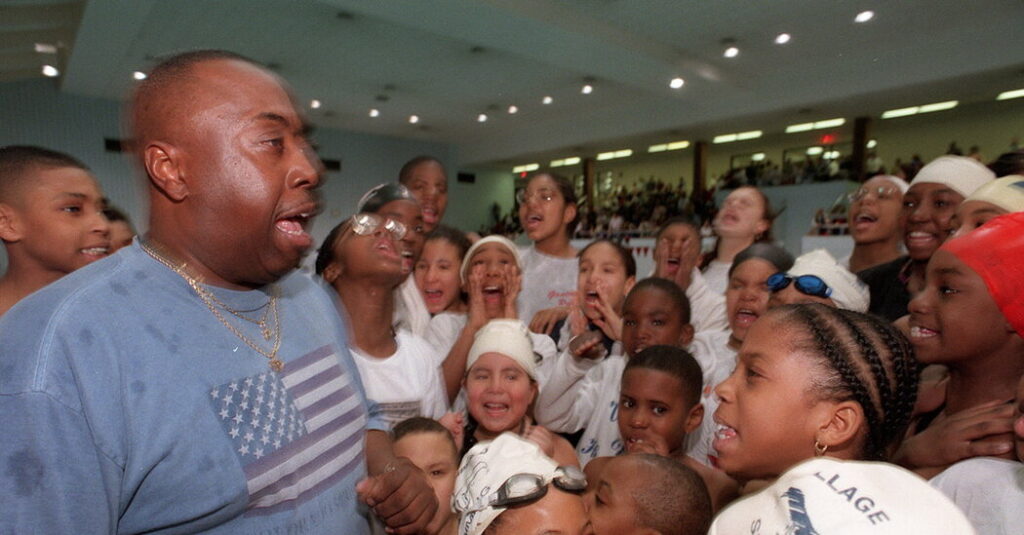Robert Trotman, who for six decades trained thousands of minority youngsters in the New York City area to swim and developed a national reputation for his work, died on March 22 at his home in Massapequa, N.Y., on Long Island. He was 82.
His daughter, Jennifer Ann Trotman, who is also a swim coach, said the cause was a heart attack.
Mr. Trotman, who in the 1950s became the first Black swim team captain at DeWitt Clinton High School in the Bronx, believed strongly in bringing swimming to minority youths, many of whom had never been exposed to the sport in the urban locations where his Nu-Finmen swim team has operated over the years, none of those places known as swimming oases: the Bedford-Stuyvesant section of Brooklyn; Hempstead, on Long Island; and Newark and Jersey City in New Jersey. The team is now based in Cambria Heights, Queens.
“There’s never been a great Black competitive swimmer, not because they can’t swim but because they don’t have easy access to pools, camps, trainers,” Mr. Trotman told The New York Times in 1973, more than a dozen years after he and a friend founded Finmen. (He spoke well before Anthony Nesty, representing Suriname, became the first Black swimmer to win an Olympic gold medal, at the 1988 Summer Games, and before Simone Manuel of the United States became the first Black female swimmer to win an individual gold medal, at the 2016 Summer Olympics.)
“Basically,” he said, “it’s a sport for the wealthy. Every kid plays basketball, but a swimmer needs devotion and self-denial.”
In a phone interview, his daughter said: “He wanted to get rid of the myth that Black people can’t swim. He grew up in swimming not seeing someone who looked like him. He felt it was important to see an example of what you can be.”
Mr. Trotman, who was a New York City subway motorman for 20 years, also coached a swim team in the village of Hempstead and was the assistant coach under his daughter at York College in Jamaica, Queens, from 2002 to 2016.
One of their swimmers, Paulana Lamonier, said by phone: “He was funny, he was a sharpshooter, and never held back when it came to giving you feedback and releasing your potential.”
After her freshman year at York, Ms. Lamonier began to coach at Nu-Finmen; in 2019, she started Black People Will Swim, a program that encourages Black and brown people to overcome their fear of swimming. She is also the co-head coach of York’s swim team.
“His example definitely inspired me to coach,” Ms. Lamonier said of Mr. Trotman.
Robert Austin Trotman was born on Oct. 15, 1940, in Manhattan. His father, Gladstone, was a clothes presser. His mother, Irma (Willoughby) Trotman, was a homemaker.
Robert was scared of the ocean the first time he encountered it, when he was 8. But he soon learned to swim at a club in the Bronx.
“I had a coach who had a real mosaic team: Hispanics and Blacks, Polish and Italians,” Mr. Trotman told Newsday in 2003. But, he added, he noticed that most of his competitors at swim meets were white.
Later, in addition to swimming for his high school team, he competed with an Amateur Athletic Union team and became a lifeguard.
He and his friend Charles Simmons started the Finmen in 1959 at the St. John’s Recreation Center in Brooklyn. (It changed its name over the years, to Trot’s Finmen in the 1980s and Nu-Finmen in the early 1990s.) Serving in the Army’s 82nd Airborne Division at Fort Bragg, N.C., from 1962 to 1964, he taught officers’ wives and children how to swim.
After his discharge, Mr. Trotman attended Queens College for two years. With Nu-Finmen, he trained Junior Olympic champions, all-state swimmers, N.C.A.A. All-Americans and Nassau County, N.Y., champions to compete in swim meets in the New York area and elsewhere on the East Coast.
In 1981, he started the Dr. Martin Luther King Jr. Swim Classic, a multicultural event that every year attracts hundreds of swimmers from the United States and the Caribbean to Eisenhower Park in East Meadow, on Long Island.
In 2014, he received the Diversity, Equity & Inclusion Award of U.S.A. Swimming, the national governing body of the sport, for supporting and introducing swimming to underrepresented groups.
“I started with U.S.A. Swimming 50 years ago when they asked me to come work with minority kids,” Mr. Trotman is quoted as saying on the organization’s website. “My thing has always been that I will give you what you need, and you work for what you want.”
One of his youngest swimmers, Karim Chesimard, was brought to Mr. Trotman at 3, in 1994, to help him overcome his fear of the water.
“Coach took him screaming and trying to hold on to me for dear life, just dragged him away,” Karim’s father, Andre Chesimard, told The Times in 1998. “Within an hour, Karim was in the water like nothing had happened, and two days later he was swimming laps across the pool using a flat board.”


